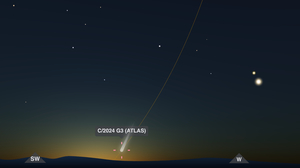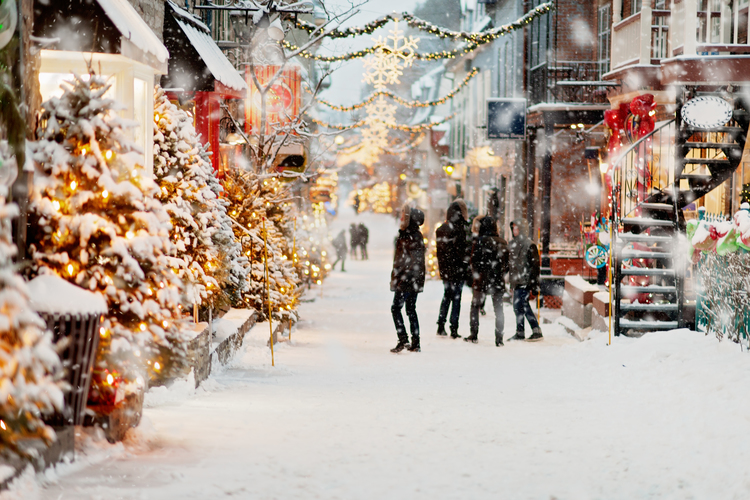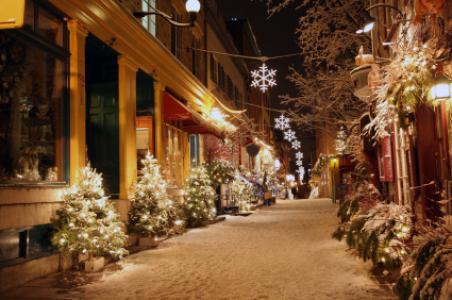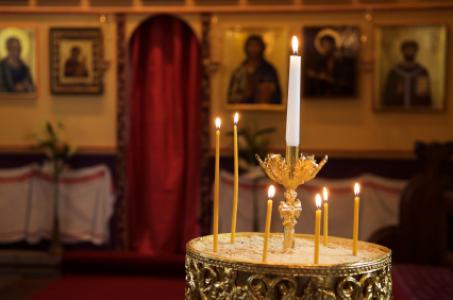
Best Comet of 2025?
C/2024 G3 (ATLAS) has already become very faintly visible to the naked eye for observers in the Southern Hemisphere.
Many Christians in Canada mark the birth of Jesus Christ on December 25, which is known as Christmas Day. It is a day of celebration when many Canadians exchange gifts and enjoy festive meals.
Christmas Day is a public holiday. It is a day off for the general population, and schools and most businesses are closed.

Christmas in Old Quebec, Canada.
©iStockphoto.com/lisegagne
The best days to take off work in 2025
Many Canadians have a day off work on December 25 and many spend the day with close relatives or friends. It is customary to exchange gifts, enjoy a special festive meal and, perhaps, attend a special church service. However, some people, particularly in Quebec, do some or all of these things on Christmas Eve as well as, or instead of, on Christmas Day.
The traditions centered on Christmas gifts in Canada vary a lot between families. In some families, a mythical figure called Santa Claus brings gifts. He travels on a sleigh pulled by reindeer, enters homes via the chimney and leaves presents and candy in Christmas stockings or in a pile under the Christmas tree. In other families, individual members exchange carefully selected gifts. Popular gifts are toys, games and candy for children and clothes, music, alcohol and practical or luxury items for adults. Canadians may open their presents on Christmas Eve after a special church service or during the morning or after lunch on Christmas Day.
Some people consume large quantities of food and drinks on Christmas Day. The day may start with a cooked breakfast, such as ham and eggs or pancakes. Dinner is often a very large meal with a stuffed or dressed roast turkey, potatoes, a selection of vegetables and cranberry sauce and gravy to add flavor. Popular desserts include pumpkin pie and plum or Christmas pudding. During the day, many types of sweet and savory snacks are served, including candy, oranges or mandarins, nuts and butter tarts or shortbread.
Alcoholic witches and Christmas poop: 7 weird Christmas traditions
Christmas Day is a national public holiday in Canada. Schools, post offices and many businesses and organizations are closed on Christmas Day. Some stores may be open. Many public transport services are closed or offer a reduced service. When Christmas Day falls on a Sunday or Saturday that is a non-working day, workers are entitled to a holiday with pay on the working day immediately preceding or following the general holiday.
Many Christians celebrate the birth of Jesus of Nazareth in Bethlehem on December 25, although the true date and year of his birth is unclear. The tradition of celebrating his birth at the end of December may come from the widespread European tradition of celebrations around the winter solstice. Christians who follow the Eastern Orthodox tradition celebrate the birth of Jesus on January 7, while it is marked on January 6 by the Armenian Apostolic Church.
There are many symbols of Christmas. These include images of baby Jesus and the Holy family in the stable, stars and Christmas trees. Another important symbol of Christmas is Santa Claus. This is a mythical figure with origins in European, particularly British, Dutch and German, cultures. He is a jolly man who wears a red suit, has a long white beard, lives at the North Pole and travels in a sleigh pulled by reindeer. On Christmas Eve, he travels to the homes of children and leaves them presents in Christmas stockings or under the Christmas tree.
The North American Aerospace Defense Command (NORAD), which monitors and controls the aerospace above the United States and Canada, even "monitors" Santa's movements during November and December. Images and models of Santa Claus and actors playing his role can be seen in many places in the lead up to Christmas.
| Year | Weekday | Date | Name | Holiday Type | Area |
|---|---|---|---|---|---|
| 2020 | 金曜日 | 12月25日 (金) | Christmas Day | Statutory Holiday | |
| 2021 | 土曜日 | 12月25日 (土) | Christmas Day | Statutory Holiday | |
| 2021 | 月曜日 | 12月27日 (月) | Day off for Christmas Day | Statutory Holiday | All |
| 2022 | 日曜日 | 12月25日 (日) | Christmas Day | Statutory Holiday | |
| 2023 | 月曜日 | 12月25日 (月) | Christmas Day | Statutory Holiday | |
| 2024 | 水曜日 | 12月25日 (水) | Christmas Day | Statutory Holiday | |
| 2025 | 木曜日 | 12月25日 (木) | Christmas Day | Statutory Holiday | |
| 2026 | 金曜日 | 12月25日 (金) | Christmas Day | Statutory Holiday | |
| 2027 | 土曜日 | 12月25日 (土) | Christmas Day | Statutory Holiday | |
| 2027 | 月曜日 | 12月27日 (月) | Day off for Christmas Day | Statutory Holiday | All |
| 2028 | 月曜日 | 12月25日 (月) | Christmas Day | Statutory Holiday | |
| 2029 | 火曜日 | 12月25日 (火) | Christmas Day | Statutory Holiday | |
| 2030 | 水曜日 | 12月25日 (水) | Christmas Day | Statutory Holiday |
While we diligently research and update our holiday dates, some of the information in the table above may be preliminary. If you find an error, please let us know.

C/2024 G3 (ATLAS) has already become very faintly visible to the naked eye for observers in the Southern Hemisphere.

Christmas Eve in Canada is the day before Christmas Day and always falls on December 24 according to the Gregorian calendar.

The day after Christmas Day is known as Boxing Day and is a holiday in many parts of Canada.

Many Orthodox Christian churches in countries such as Canada celebrate New Year’s Day on January 14 in the Gregorian calendar.